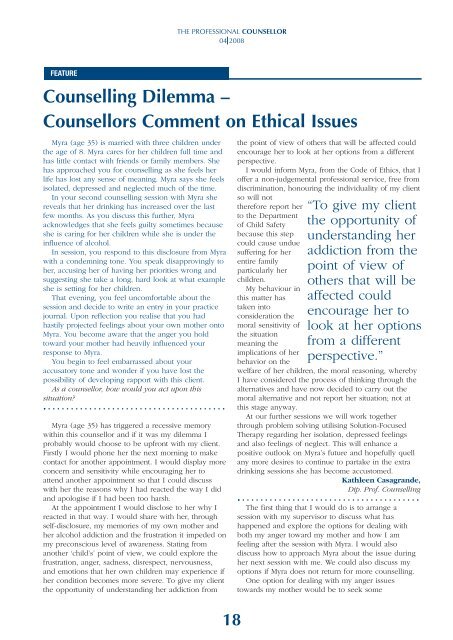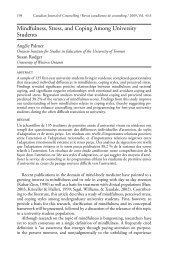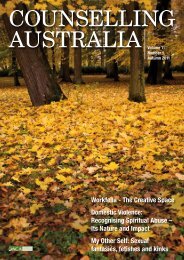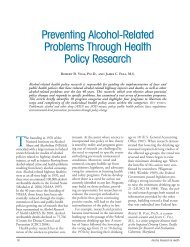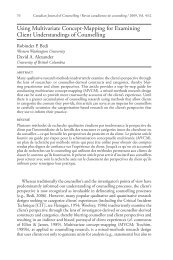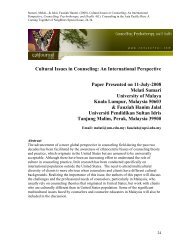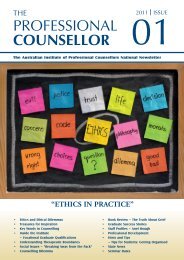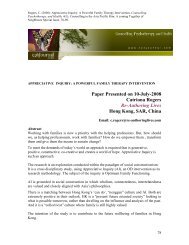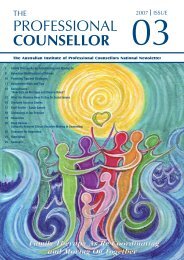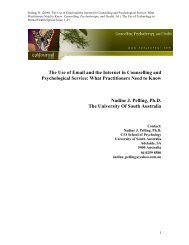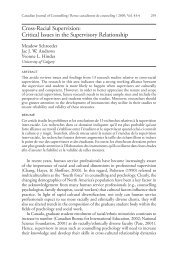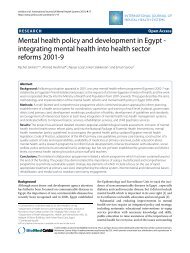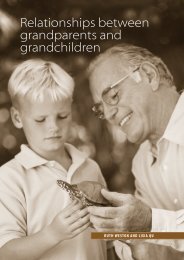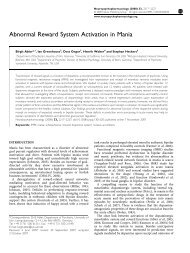Counselling Practice - Becoming a Reflective Practitioner
Counselling Practice - Becoming a Reflective Practitioner
Counselling Practice - Becoming a Reflective Practitioner
Create successful ePaper yourself
Turn your PDF publications into a flip-book with our unique Google optimized e-Paper software.
THE PROFESSIONAL COUNSELLOR<br />
04 2008<br />
FEATURE<br />
<strong>Counselling</strong> Dilemma –<br />
Counsellors Comment on Ethical Issues<br />
Myra (age 35) is married with three children under<br />
the age of 8. Myra cares for her children full time and<br />
has little contact with friends or family members. She<br />
has approached you for counselling as she feels her<br />
life has lost any sense of meaning. Myra says she feels<br />
isolated, depressed and neglected much of the time.<br />
In your second counselling session with Myra she<br />
reveals that her drinking has increased over the last<br />
few months. As you discuss this further, Myra<br />
acknowledges that she feels guilty sometimes because<br />
she is caring for her children while she is under the<br />
influence of alcohol.<br />
In session, you respond to this disclosure from Myra<br />
with a condemning tone. You speak disapprovingly to<br />
her, accusing her of having her priorities wrong and<br />
suggesting she take a long, hard look at what example<br />
she is setting for her children.<br />
That evening, you feel uncomfortable about the<br />
session and decide to write an entry in your practice<br />
journal. Upon reflection you realise that you had<br />
hastily projected feelings about your own mother onto<br />
Myra. You become aware that the anger you hold<br />
toward your mother had heavily influenced your<br />
response to Myra.<br />
You begin to feel embarrassed about your<br />
accusatory tone and wonder if you have lost the<br />
possibility of developing rapport with this client.<br />
As a counsellor, how would you act upon this<br />
situation<br />
Myra (age 35) has triggered a recessive memory<br />
within this counsellor and if it was my dilemma I<br />
probably would choose to be upfront with my client.<br />
Firstly I would phone her the next morning to make<br />
contact for another appointment. I would display more<br />
concern and sensitivity while encouraging her to<br />
attend another appointment so that I could discuss<br />
with her the reasons why I had reacted the way I did<br />
and apologise if I had been too harsh.<br />
At the appointment I would disclose to her why I<br />
reacted in that way. I would share with her, through<br />
self-disclosure, my memories of my own mother and<br />
her alcohol addiction and the frustration it impeded on<br />
my preconscious level of awareness. Stating from<br />
another ‘child’s’ point of view, we could explore the<br />
frustration, anger, sadness, disrespect, nervousness,<br />
and emotions that her own children may experience if<br />
her condition becomes more severe. To give my client<br />
the opportunity of understanding her addiction from<br />
18<br />
the point of view of others that will be affected could<br />
encourage her to look at her options from a different<br />
perspective.<br />
I would inform Myra, from the Code of Ethics, that I<br />
offer a non-judgemental professional service, free from<br />
discrimination, honouring the individuality of my client<br />
so will not<br />
therefore report her<br />
to the Department<br />
of Child Safety<br />
because this step<br />
could cause undue<br />
suffering for her<br />
entire family<br />
particularly her<br />
children.<br />
My behaviour in<br />
this matter has<br />
taken into<br />
consideration the<br />
moral sensitivity of<br />
the situation<br />
meaning the<br />
implications of her<br />
behavior on the<br />
“To give my client<br />
the opportunity of<br />
understanding her<br />
addiction from the<br />
point of view of<br />
others that will be<br />
affected could<br />
encourage her to<br />
look at her options<br />
from a different<br />
perspective.”<br />
welfare of her children, the moral reasoning, whereby<br />
I have considered the process of thinking through the<br />
alternatives and have now decided to carry out the<br />
moral alternative and not report her situation; not at<br />
this stage anyway.<br />
At our further sessions we will work together<br />
through problem solving utilising Solution-Focused<br />
Therapy regarding her isolation, depressed feelings<br />
and also feelings of neglect. This will enhance a<br />
positive outlook on Myra’s future and hopefully quell<br />
any more desires to continue to partake in the extra<br />
drinking sessions she has become accustomed.<br />
Kathleen Casagrande,<br />
Dip. Prof. <strong>Counselling</strong><br />
The first thing that I would do is to arrange a<br />
session with my supervisor to discuss what has<br />
happened and explore the options for dealing with<br />
both my anger toward my mother and how I am<br />
feeling after the session with Myra. I would also<br />
discuss how to approach Myra about the issue during<br />
her next session with me. We could also discuss my<br />
options if Myra does not return for more counselling.<br />
One option for dealing with my anger issues<br />
towards my mother would be to seek some


